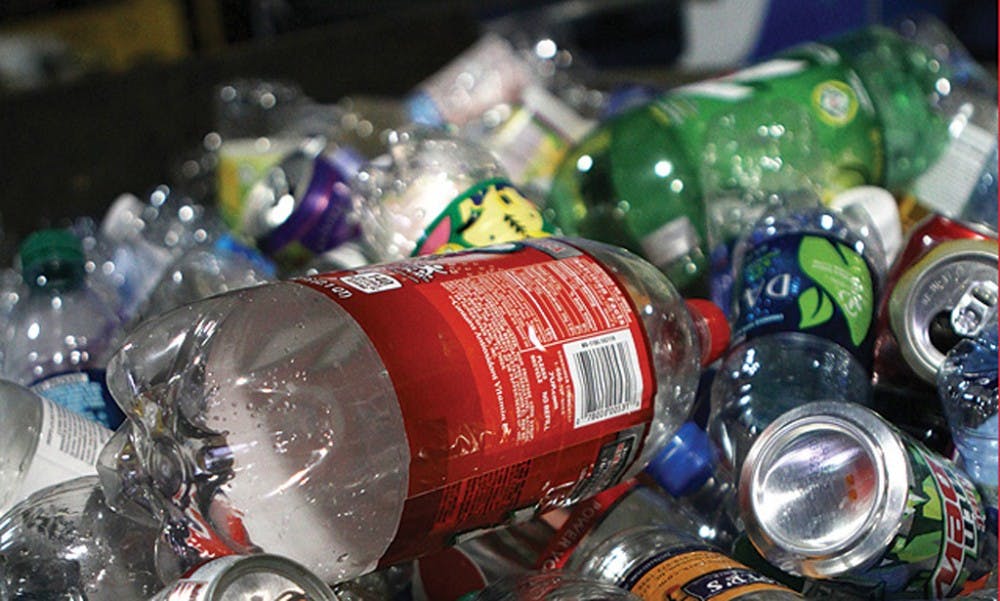While several of Duke’s sustainability efforts have been paused temporarily due to coronavirus-related safety precautions, students say that campus dialogue and activism related to environmentalism have forged ahead.
Duke Sustainability Director Tavey Capps explained in an email to The Chronicle that the effects of the COVID-19 pandemic on the University’s budget and campus population have “potentially delayed” several sustainability-related initiatives, like the exploration of an electric vehicle incentive for employees and a campaign encouraging the use of environmentally-friendly transportation alternatives.
The usual operations of the Duke Campus Farm have been put on hold, Capps wrote. These include educational elements and the Community Supported Agriculture program. The farm is currently donating produce to Root Causes, an organization run by Duke medical students that distributes food to vulnerable populations.
Other environmentally-friendly activities have also been paused by the pandemic.
At the beginning of the fall semester, Duke Dining paused the reusable to-go container and reusable mug programs. Furthermore, all campus dining locations are currently serving all meals only in disposable to-go packaging, rather than giving students the option of eating on reusable dishes like in the past.
“Due to the potential risk of coronavirus transmission from collecting, rinsing and washing used containers, we chose to prioritize the health, safety and comfort of our team members. These programs will be reintroduced, but due to the uncertainty surrounding [COVID-19], we are unable to identify a specific date,” wrote Marcus Carson, Duke Dining’s assistant director for sustainability and quality control, in an email to The Chronicle.
It’s not all bad news, though. Duke’s greenhouse gas emissions were down significantly at the end of the last fiscal year and are expected to be even lower at the end of this year, Capps noted.
Due to “an approximately 30% reduction in air travel and employee commuting emissions,” and reduced electricity and natural gas use on campus—both factors that were related to many students and faculty working remotely—Duke’s greenhouse gas emissions in the fiscal year ending in 2020 were down 34% from the fiscal year ending in 2007, which is the baseline year, Capps wrote.
As a reference, emissions in the fiscal year ending in 2019 were down 20% from the baseline year, according to Capps.
Capps explained that while she expects emissions for the fiscal year ending in 2020 to be even lower, the longevity of the trend depends on whether people continue to engage in the kinds of energy-saving behaviors that have been necessitated by the pandemic, such as hosting virtual meetings instead of traveling to them.
Furthermore, Duke’s commitment to reaching carbon neutrality by 2024 and the strategies outlined in the University’s 2019 Climate Action plan have not changed, according to Capps.
Despite initiatives like the reusable container program being put in jeopardy, sustainability-related student groups believe that this could be a “critical moment” to fight for larger-scale changes, according to junior Zac Johnson, vice president of Duke Student Government’s services and sustainability committee.
“We might be perfectly poised to make a case to the administration about projects that they wouldn’t necessarily agree to in the past,” Johnson said, naming environmental justice and fossil fuel divestment as important potential avenues for change.
Senator Hana Hendi, a sophomore, agreed about the opportunities posed by the present moment.
“This is the perfect time to start planning, to start cultivating evidence, resources, support, in order to finally present a lot of these big proposals,” she said.
Johnson and Hendi emphasized the importance of environment-focused student groups—like the Undergraduate Environmental Union—in pushing for change on campus. Johnson said that one of his goals for the DSG committee this year is to facilitate cooperation and partnership with other groups.
“This is kind of the perfect moment. For one, the fact that everything is so liminal right now, and we don’t really know what’s going to happen in the world after this, makes this a perfect time to rebuild things,” Johnson said.
He added that he thinks the state of the world right now has made people reevaluate their priorities, which in turn might help to increase the momentum of activism on campus.
Senior Cameron Oglesby, president of the Duke Undergraduate Environmental Union, said that while she thinks Duke does a good job pushing sustainability initiatives, she believes that the continued effort of students and student groups is incredibly important.
“I think that the university has done a good job generally in moving toward a more sustainable campus. I know Sustainable Duke is trying its best within the confines of what it is allowed to do and how things work within the infrastructure of Duke,” Oglesby said.
Oglesby, also graphics editor for The Chronicle, feels confident that student activism around sustainability and environmentalism will continue to be strong despite any challenges posed by the pandemic.
“I think that it’s really nice to know that after I leave there will be a dedicated group of students really pushing for these changes on campus,” Oglesby said. “And they’re pushing for them to be done in a more equitable way, and for the University in terms of its sustainable practices and sustainability education to be more inclusive of diverse groups, mindsets and perspectives.”
Get The Chronicle straight to your inbox
Signup for our weekly newsletter. Cancel at any time.

Anna Zolotor is a Trinity senior and recruitment chair for The Chronicle's 118th volume. She was previously news editor for Volume 117.

